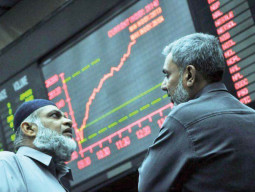
"Net demand continued to increase across all loan categories in the fourth quarter of 2018, but banks expect some moderation in demand over the next three months," the ECB said in a statement.
In the three months to December, low interest rates encouraged both firms and households to borrow, with businesses using cash for investment and mergers and acquisitions, while a rising housing market spurred individuals to seek mortgages.
500-euro note gets last print run
The survey of 147 lenders between December 7 and 28 did not ask why demand for loans might flatten out between January and March.
But many observers have pointed to signs the eurozone is slowing in both "hard" economic data and "soft" indicators from surveys.
On Monday, IMF forecasters slashed their 2019 growth outlook for the 19-nation bloc, to 1.6% -- 0.3 percentage points lower than their previous quarterly prediction.
Beyond the ebbing growth visible in regular data releases, unpredictable risks lurk -- from the danger of Britain leaving the EU without a deal, to a mounting three-way trade confrontation with the United States and China or domestic upsets like France's "yellow vest" protests.
ECB launches real-time payments in challenge to tech giants
Those factors did not brake appetite for credit nor banks' readiness to lend in the fourth quarter of 2018, the ECB survey showed, with lending standards -- the criteria banks use to judge prospective borrowers -- steady for companies and mortgage seekers.
In the coming months, the survey found that banks' stocks of "non-performing" loans, where the borrower has fallen behind on repayments, could contribute to a squeeze on new lending activity.
Meanwhile, lenders reported they continued to ease the terms and conditions of repayment on loans in the fourth quarter.



1730959638-0/trump-(19)1730959638-0-165x106.webp)













COMMENTS
Comments are moderated and generally will be posted if they are on-topic and not abusive.
For more information, please see our Comments FAQ